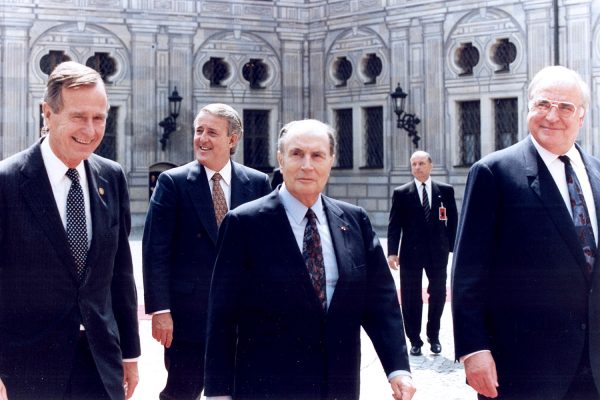
The history of America is not unlike that of any other nation: its most revered leaders are usually founders and war statesmen.
Historical figures emerging in a time of crisis are always important, but they remain men of their time. It is easy to be revered when the population rallies to the flag and there is no internal opposition. More difficult is to achieve a record of governing efficiency in a time of peace, yet this was exactly the triumph of George Herbert Walker Bush.
Record
Like most good men, his record as president was not a perfect one. He was a one-term president after all.
In domestic politics he was plagued by economic problems. He alienated fellow Republicans by agreeing with the Democrats to raise taxes to pay down the deficit. This was deeply unpopular, but Bush didn’t back down for populist reasons and did what he thought was best for an ailing economy.
Bush similarly defied his own constituency in bringing about the Clean Air Act and implementing some measure of gun control, costing him membership in the National Rifle Association in the process.
He was nevertheless a right-wing president, passing deregulatory legislation that would provide his successor Bill Clinton with two terms of unwavering prosperity.
The elder Bush’s greatest triumphs were in foreign policy. He did not shy away from using military force but did it sparingly and always with a clear exit strategy and limited goals in mind. He dethroned former American ally Manuel Noriega in Panama when his drug dealings conflicted with Bush’s war on drugs and American interests at large. He defeated Iraq’s invasion of Kuwait, reassuring the Arab Gulf monarchies allied to the United States and thus preserving Western dominion of Middle East oil supply for the succeeding decades.
Under his tenure, American forces were also deployed to Somalia to aid United Nations food distribution but, unlike his successor, Bush’s mandate of these forces never diverted from its initial conservative goals.
As president, Bush’s own claim at historical relevance was overseeing the collapse of the Soviet Union. He acted wisely by treating the weakened Gorbachev perestroiked country with respect and leading it to sign the missile reduction treaty START I as well as the Helsinki Accords. While not his doing, he helped manage the collapse by dealing with the Russian Federation as a partner of the United States’.
Post-presidency
All this would be highly impressive on its own, but in order to truly admire President Bush one would have to remember that he did not achieve all this by chance. He painstakingly built a political career starting from Texas congressman, United Nations ambassador, Republican National Committee chairman, envoy to China, director of the CIA and vice president. He worked in the oil business for a time and proved his academic valor as an accomplished director of the Council on Foreign Relations. Finally, this philosopher king made sure to keep a low profile after he left office.
As former president, he offered advice to all his successors and had no compunction in having his former administration staff criticize by proxy his own son’s policy of attacking Iraq for ideological reasons.
Former presidents should not for institutional reasons criticize the ruling administration, but Bush came close to this by conveying what everyone perceived to be a very public message to his son. As with many other areas of political intervention, Herbert Walker would ultimately be proven right.
Legacy
Any analysis of a leader cannot be complete without mentioning faults. H.W. was active in the promotion of his sons W. and Jeb’s political careers, which in a nation averse to monarchy brought him criticism of instilling a political dynasty.
As an aging statesman, his active support for political initiatives against the candidate-turned-President Donald Trump proved shortsighted as well. Not only because it broke with his habit of not meddling in current politics, but especially because the #NeverTrump movement was an emotional elitist outcry against valid popular demands for political reform, and one which ultimately failed.
That said, not all politicians are capable of becoming statesmen, but George H.W. Bush was easily a better leader in one term than most presidents turn out to be in two; a career made all the more admirable without the war glories of the likes of Washington, Lincoln or Roosevelt.
Bush senior is the case study to take into account when studying political acumen. The fact that historians will undoubtedly recognize this and the people didn’t — when they denied him a second term — surely says more about the people that it does about the man.
